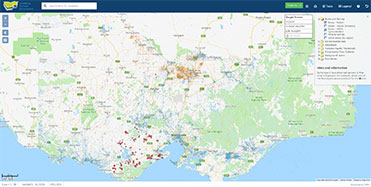
CeRDI Newsletter Autumn 2018
In this issue:
- Message from the Director
- Success for Federation University with the Digital Health CRC
- Data Democracy short films Launched
- Barwon Coast Committee of Management Beach Usage Research
- Soil CRC Workshops
- SWIFFT and Visualising Victoria’s Biodiversity
- EstuaryWatch wins 2018 Victorian Coastal Award
- Western Australia Healthy Estuaries portal
- Visualising Victoria’s Groundwater Relaunch
- Our Coast wins prestigious National Award
- Staff profile: Rick Pope, Research Associate
- CeRDI news snippets
- Postgraduate student news
- About CeRDI
- Contact CeRDI
Message from the Director
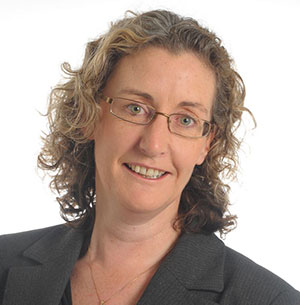 |
|
|
Associate Professor |
|
Welcome to another issue of the CeRDI newsletter.
We have had many successes over the last few months. Most recently Federation University received news that the Digital Health Cooperative Research Centre (CRC) has been funded for the next seven years. This is the third CRC that the University has joined as a major participant. CeRDI leads Federation University’s participation in the Food Agility CRC and Soil CRC and will also contribute eResearch and digital innovation capability to the Digital Health CRC.
CeRDI recently embarked on a data democracy project culminating in a series of short, documentary-style films. In each of the films, experts such as Dr Gillian Sparks, Professor Richard Sinnott and others discuss a different concept associated with data democracy. These short films are part of a larger project which will be completed in coming months. Watch this space for further news.
CeRDI researchers have been busy in the field over recent months. The beach usage research in the Barwon region has received substantial community input. Findings from this research will generate new insights into regional coastal management and build a strong foundation for future research.
As one of the Soil CRC lead partners, CeRDI coordinated a major workshop in Melbourne on Soil Performance Metrics in March and a writing retreat in the Dandenong Ranges in May. A large number of delegates, and CeRDI researchers, attended both events facilitated by Associate Professor Peter Dahlhaus.
CeRDI staff have been engaged on a range of projects culminating in portal launches and relaunches. The Western Australia Healthy Estuaries data portal officially was launched in March. An updated and modernised Visualising Victoria’s Groundwater was launched during April at the Victorian Chapter meeting of the International Association of Hydrogelogists. Online Farm Trials was also relaunched in early May with a streamlined search and user interface and the inclusion of seasonally relevant collections of trials.
I enjoy sharing the research news and activities from CeRDI each quarter and welcome any feedback you may have on this publication, or any of our projects.
Associate Professor Helen Thompson
Director, CeRDI
May 2018
Success for Federation University with the Digital Health CRC
.jpg) |
|
Federation University together with 15 universities and 69 government and industry partners has been awarded $55 million funding over seven years from the Federal government to establish the Digital Health Cooperative Research Centre (CRC).
The CRC for Digital Health will improve the health and health care of Australians and advance the economy with collaborative research and development using a combination of multi-disciplinary skills, industry knowledge, technologies, networks and data.
The project will address a broad set of aims that include empowering consumers, understanding and managing health risks of individuals and communities, supporting clinical practice, improving system efficiency and access to quality care, and building and enhancing businesses to provide high value jobs and solutions in a growing global market.
Data Democracy short films launched
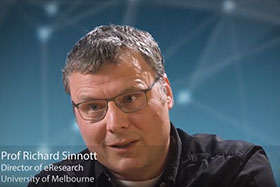 |
|
CeRDI recently commissioned a series of short films about data democracy that are now publicly available on the CeRDI website.
Data Democracy FAQ provides fresh insights from leading Australian experts about the key concepts associated with data democracy. A series of short films showcase leading experts explaining and discussing data democracy. Big data is a commonly used term, but what is it? Data Democracy is the concept of creating a level playing field where we can all access the available data in a timely and equitable way. But can data democracy ever work? What are the benefits of a data democracy for society, industry and government? What are the risks if everyone has free and open access to data?
Key speakers in the films include Dr Gillian Sparkes, Commissioner for Environmental Sustainability Victoria, Professor Richard Sinnott, Director of eResearch at the University of Melbourne and Professor of Applied Computing Systems, Mr George Fong, Director of Lateral Plains, and Mr Paul Box, Social Architect at CSIRO. CeRDI’s Associate Professor Helen Thompson and Associate Professor Peter Dahlhaus also provide key commentary about the concept and importance of data democracy.
Barwon Coast Committee of Management Beach Usage Research
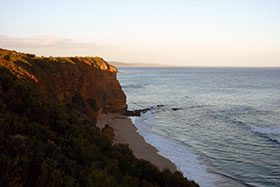 |
|
|
Photo taken by: Alison Ollerenshaw |
|
Over the last few months CeRDI has been working with communities and coastal management staff to understand and inform a range of complex coastal usage and environmental management issues currently being experienced across the Barwon Coast region.
In late 2017, the Barwon Coast Committee of Management commissioned CeRDI to undertake research with beach users, and the wider community, to gauge their knowledge, attitudes and behaviours in relation to coastal management, including dog control, beach use and the local ecosystem across three local beaches.
This research is being led by CeRDI’s Dr Angela Murphy, together with Jennifer Corbett, Pat Bonney and Meghan Taylor. The team carefully designed the research framework for this project to include various data collection methods to ensure broad stakeholder involvement and rich data retrieval. Online surveys were employed to capture baseline data from the community while additional input from coastal management staff, community groups and individuals was collected during a series of focus groups conducted during April. At these meetings, participant’s contributed to discussions about coastal management issues, enabling the researchers to map the key issues for each of the local area beaches.
Soil CRC Workshops
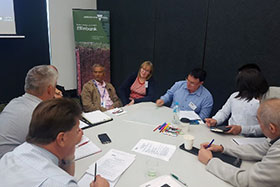 |
|
|
Soil CRC Workshops |
|
In March, Associate Professor Peter Dahlhaus facilitated the Cooperative Research Centre (CRC) workshop on Soil Performance Metrics. The theme of the workshop was a review of the indicators of soil health and function: farmers’ needs and data management.
CeRDI is a major participant in the Soil CRC (officially, the CRC for High Performance Soils) which was awarded $39.5 million from Federal Government over 10 years to help Australian farmers make decisions on complex soil management issues. Awarded in 2017, the CRC is designed to optimise productivity, yield and profitability and ensure long-term sustainability of farming businesses.
The Soil CRC workshop, held at Agriculture Victoria’s AgriBio research centre at Bundoora, was attended by over forty delegates, including researchers and grower groups from as far afield as New Zealand, Perth and Townsville. The aim of the three-day workshop was to review which soil properties would provide pragmatic indicators of soil health and function for farmers and stakeholders that could then be translated into the practical management of agricultural resources; profitability and sustainability. CeRDI’s Andrew MacLeod, Associate Professor Helen Thompson, Dr Nathan Robinson and Dr Megan Wong joined Associate Professor Pete Dahlhaus at the three-day workshop.
SWIFFT and Visualising Victoria’s Biodiversity
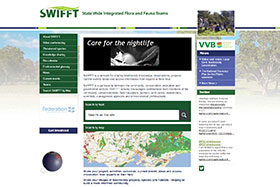 |
|
The State Wide Integrated Flora and Fauna Teams (SWIFFT) is an initiative to advance citizen science by facilitating awareness and the sharing of knowledge in relation to biodiversity conservation and threatened species for Victoria. Visualising Victoria’s Biodiversity (VVB) is an online portal that provides the Victorian community with access to a wide range of spatial information on Victoria's environmental values, conservation activities and research. The VVB is a complementary tool to the resources provided by SWIFFT.
EstuaryWatch wins 2018 Victorian Coastal Award
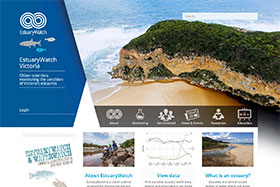 |
|
During a ceremony in Melbourne on 17 May for the 2018 Victorian Coastal Awards, EstuaryWatch Victoria received the Community Engagement award. These awards celebrate the efforts of Victorians in protecting and enhancing Victoria’s coastal and marine environments and are an initiative of the Victorian Coastal Council.
EstuaryWatch Victoria is a prominent citizen science program promoting the monitoring of estuary health and local waterways across 18 Victorian regions and is supported in its efforts through involvement of local catchment management authorities. A strong focus of the program is on the contribution provided by the community and volunteers to assist with regional data collection and recordings of water quality across Victoria’s rivers and associated waterways.
During 2016, CeRDI completed substantial redevelopment work for EstuaryWatch Victoria. CeRDI’s research and technical support staff worked closely with project partners and program coordinators to ensure that EsturaryWatch could better respond to a groundswell of community interest by providing more effective access to information and long term data on the condition of Victorian estuaries.
Western Australia Healthy Estuaries portal
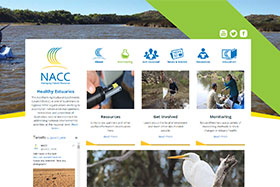 |
|
CeRDI recently completed work contributing to the development of the Healthy Estuaries portal for Northern Agricultural Catchments Council (NACC) in Western Australia.
Launched in early March, the Healthy Estuaries portal offers access to community monitoring information for Hill and Moore river estuaries, as well as additional complementary information on several other sites. The portal has been designed to enhance the user experience offering information that is easily accessible, practical and informative. A key feature is the enabling of data sharing from citizen scientists involved in estuary monitoring events.
CeRDI technical staff members Paul Feely, Andrew MacLeod, Sudeera Abeywickrema, Heath Gillett, and researcher Dr Birgita Hansen designed and developed the portal following extensive consultation and discussion with staff at Northern Agricultural Catchments Council. Victorian EstuaryWatch staff provided advice on user- experience in the development of the new portal.
Visualising Victoria’s Groundwater Relaunch
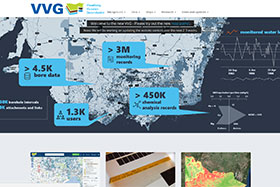 |
|
An updated and modernised Visualising Victoria’s Groundwater (VVG) portal was recently launched at a meeting of the International Association of Hydrogeologists (Victorian Chapter) by Associate Professor Peter Dahlhaus.
VVG was first launched in July 2012 offering an interoperable spatial information portal that federates groundwater data from disparate sources. The major focus of the research is to provide easy access to all of Victoria’s groundwater bore data and make it available to the public in an intuitive to use web portal.
This is achieved by directly linking to the repositories of data that are managed by various government departments, agencies and research institutions and displaying the bores on a map, with links to the individual data for each bore. VVG tools make it easy to dynamically model the interoperable data and deliver useful outputs to end users, including groundwater researchers, managers, consultants, farmers and users.
Our Coast wins prestigious National Award
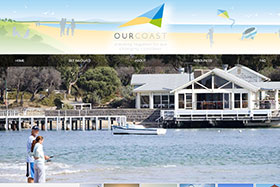 |
|
The City of Greater Geelong, together with the Borough of Queenscliffe and project partners recently won the prestigious Australian Coastal Councils’ Climate Adaptation Award for the Our Coast project.
The Our Coast program, established by a partnership between the City of Greater Geelong and the Borough of Queenscliff, focuses on 190km of shoreline around the Bellarine Peninsula, including Point Wilson, Swan Bay and Breamlea. Other key collaborators include the Corangamite Catchment Management Authority, Barwon Coast Committee of Management, Bellarine Bayside Foreshore Committee of Management and the Department of Environment, Land, Water and Planning.
Our Coast is an initiative that identifies and addresses risks associated with sea level rise, offering cutting-edge innovation at a grass roots level. It involved three stages - a coastal mapping project; coastal climate change assessment; and coastal adaptation pathways.
Staff profile: Rick Pope, Research Associate
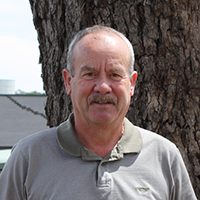 |
|
|
Rick Pope, Research Associate |
|
Rick Pope joined the CeRDI team in 2015 having studied and worked at Federation University since 2000, first as a student in the Graduate Diploma in Land Rehabilitation and then as a part-time lecturer. Prior to his involvement at Federation University, Rick worked in various roles across State Government.
Rick has extensive expertise in Geographic Information Systems (GIS) and Global Positioning Systems (GPS), having worked with these technologies since they first emerged in Victoria. He has contributed to many applications as a developer including turn key GIS applications for ESSO Australia, Keep Australia Beautiful, and the Woady Yaloak Catchment. Rick continues to have a close working relationship with local government and the spatial industry and is connected with Landcare networks in Victoria, Queensland and Western Australia.
Rick’s experience in local government, and as a volunteer, together with his GIS and GPS expertise makes him a valued member of CeRDI. He is currently working on three projects in CeRDI including the web representation of Ballarat’s historical underground mining, converting 3D data to be visualised at 2D for Historic Urban Landscape Ballarat. He is also contributing to Landcare legacy data research which involves exploring and visualising funding benefits over the past 20 years via the Corangamite Natural Resource Management portal. Rick is also collaborating on the flood plain mapping for the Glenelg Hopkins Catchment Management Authority.
CeRDI news snippets
- Online Farm Trials: The new-look Online Farm Trials (OFT) recently went live. OFT uses the latest technology to improve access to farm trial research in the Australian grains industry. The latest updates include new search capabilities, a more intuitive website interface and seasonally relevant trial collections. The OFT search is faster, utilising advanced language processing to significantly increase the relevancy of trial results from over 4,500 trial projects. Other features included on the website include typo-tolerance, synonym-matching and closer integration of the mapping interface (geosearch). www.farmtrials.com.au A detailed overview of the OFT project was showcased in CeRDI’s summer 2018 newsletter: www.cerdi.edu.au/cb_pages/news/CeRDINewsletterSummer2018.php
- Spatial Connect: Spatial Connect is a collaborative project established in partnership with the Geography Teachers Association of Victoria. The project involves the development of geography and science curriculum resources through the application and use of spatial technology used by industry and community. The program focuses on providing secondary school students with experience in using spatial technologies while using real world data and resources.The Spatial Connect resource will was officially launched at the GTAV Annual General Meeting and Patron’s event on 30 May 2018 by Lynnette Terrett – Immediate Past Chair of Destination Spatial, Director of Spatial Industries Business Association. For more information visit: www.spatialconnect.org.au/#resources
- Grampians Region Dementia Forum: CeRDI represented the University at this local forum held on 28 March. Alison Ollerenshaw gave a brief presentation on CeRDI’s role in the development of the Dementia Pathways Tool, and current content upgrades to the site. To learn more visit: www.dementiapathways.com.au
- Australian National Data Service monthly Tech Talk: Associate Professor Peter Dahlhaus presented at the Spatial Data Discovery and Interoperability online forum in March. The title of Pete’s presentation was: Spatial data interoperability in practice. To learn more visit: Monthly Tech Talk
- Book chapter: A book chapter focusing on the ‘How Well are We Doing Western Alliance for Greenhouse Action (WAGA) project’ has recently been published: http://waga.com.au/resilience-oriented-urban-planning. This book chapter examines the design of a ‘fit for purpose’ approach to tracking progress on climate change adaptation and resilience drawing upon the learnings from local governments in Australia. CeRDI, in collaboration with (WAGA), contributed to the development of the ‘How Well Are We Adapting’ web portal. The portal offers a web-based tool to assist the WAGA councils to implement a framework for monitoring, evaluation and reporting on climate adaptation. For more details go to: http://adapt.waga.com.au
- SWIFFT videoconference: Dr Birgita Hansen was one of the guest speakers for the recent State Wide Integrated Flora and Fauna Teams (SWIFFT) video conference. The theme for the conference was bird conservation. Birgita presented on the Revision of the East Asian-Australasian Flyway population estimates for 37 shorebird species listed under the EPBC Act.
- CeRDI staff updates: CeRDI welcomes three new staff members: Derek Walters, Dr Megan Good and Nigel Prior. Derek is working as a research officer and is closely involved in the Visualising Victoria’s Groundwater (VVG) portal. Megan is a vegetation ecologist and will be contributing to the research activities in the natural environment area. Nigel is experienced in information and technology and has joined CeRDI as the project manager for the Agricultural Research Data Cloud.
Postgraduate student news
PhD student Himalaya Singh recently submitted his research thesis for examination. Himalaya’s thesis is titled: Spatial Epidemiological Investigation of Sports and Leisure Injuries in Victoria Australia.
For more details on Himalya’s research see www.cerdi.edu.au/cb_pages/a_geospatial_analysis_of_sport_leisure_injuries.php
About CeRDI
The Centre for eResearch and Digital Innovation (CeRDI) is a research centre at Federation University focused on:
- the application of information and communications technology (ICT) and the development of innovative, world class knowledge management systems;
- significantly advancing the digital literacy and knowledge management capabilities of partner organisations;
- fostering partnerships for the development and implementation of eResearch with industry, government and academia; and
- measuring the impact of eResearch and digital innovation through longitudinal research.
Contact CeRDI
For further details about CeRDI's diverse portfolio of research please visit our website or contact Assoc Prof Helen Thompson.
Subscribe to the CeRDI Newsletter Mailing List
I would like to subscribe to the CeRDI Newsletter Mailing List to receive notifications of future CeRDI Newsletters.
If you have any feedback, please email newsletter@cerdi.edu.au

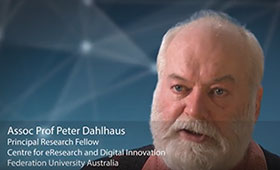
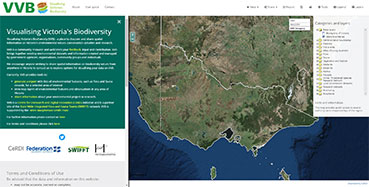
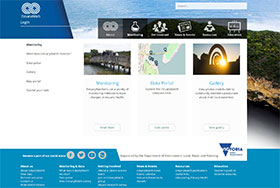
.jpg)
